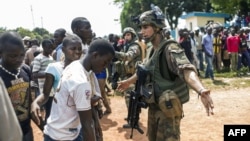DAKAR —
In the Central African Republic, the streets of the capital were calm Thursday, one week after intense fighting broke out there, but residents say weapons are still circulating and the risk of further communal violence remains.
The capital city of Bangui entered its second day Thursday of what residents say has been a "precarious calm" after a week of violence between Muslims and Christians that has killed hundreds and displaced tens of thousands.
People have been taking advantage of the lull to bury their dead.
Muslims gathered at a mosque in Bangui to bury those they said had been killed in recent days in reprisal attacks since the French military began disarming the mainly Muslim ex-rebels.
Mosques were destroyed, and there have been reports of stonings and lynchings of Muslims.
Government minister Ousmane Mahamat Ousmane says these are civilians who have been killed by the anti-balakas, or Christian militias, that he said include both armed men and regular citizens. He says he is calling on the people of the CAR to forget this spirit of vendettas and settling scores. Most of these people, he says, have been killed by their own neighbors.
Ousmane was a general in the now-disbanded Seleka rebel coalition. That coalition, made up of Muslim fighters from the north, seized control of the country in March, plunging it into chaos and committing what international human rights groups say have been serious abuses against civilians since coming to power.
Christian militiamen opposed to Seleka attacked the capital one week ago on December 5. The vicious fighting that ensued killed more than 400 people.
France rushed more troops to the CAR to work alongside a regional African force to restore law and order after getting the green light from the U.N. Security Council.
There are now 1,600 French soldiers on the ground. Their immediate focus has been forcibly disarming combatants.
But residents of Bangui say the communal violence that has continued since disarmament operations began on Monday is worrying.
This resident says "what I have seen has been terrible. Seeing people kill each other is horrible." He says French troops need to go out and patrol and protect civilians otherwise he says he doesn't understand why they are there.
Some Muslims in the city say the French aren't doing enough to disarm the Christian militias.
French authorities acknowledge that they have undertaken a dangerous and complex mission but say it was necessary to intervene to keep the country from slipping into civil war.
France plans to hand off the mission in six months to African Union troops who are still deploying to the CAR.
The capital city of Bangui entered its second day Thursday of what residents say has been a "precarious calm" after a week of violence between Muslims and Christians that has killed hundreds and displaced tens of thousands.
People have been taking advantage of the lull to bury their dead.
Muslims gathered at a mosque in Bangui to bury those they said had been killed in recent days in reprisal attacks since the French military began disarming the mainly Muslim ex-rebels.
Mosques were destroyed, and there have been reports of stonings and lynchings of Muslims.
Government minister Ousmane Mahamat Ousmane says these are civilians who have been killed by the anti-balakas, or Christian militias, that he said include both armed men and regular citizens. He says he is calling on the people of the CAR to forget this spirit of vendettas and settling scores. Most of these people, he says, have been killed by their own neighbors.
Ousmane was a general in the now-disbanded Seleka rebel coalition. That coalition, made up of Muslim fighters from the north, seized control of the country in March, plunging it into chaos and committing what international human rights groups say have been serious abuses against civilians since coming to power.
Christian militiamen opposed to Seleka attacked the capital one week ago on December 5. The vicious fighting that ensued killed more than 400 people.
France rushed more troops to the CAR to work alongside a regional African force to restore law and order after getting the green light from the U.N. Security Council.
There are now 1,600 French soldiers on the ground. Their immediate focus has been forcibly disarming combatants.
But residents of Bangui say the communal violence that has continued since disarmament operations began on Monday is worrying.
This resident says "what I have seen has been terrible. Seeing people kill each other is horrible." He says French troops need to go out and patrol and protect civilians otherwise he says he doesn't understand why they are there.
Some Muslims in the city say the French aren't doing enough to disarm the Christian militias.
French authorities acknowledge that they have undertaken a dangerous and complex mission but say it was necessary to intervene to keep the country from slipping into civil war.
France plans to hand off the mission in six months to African Union troops who are still deploying to the CAR.





